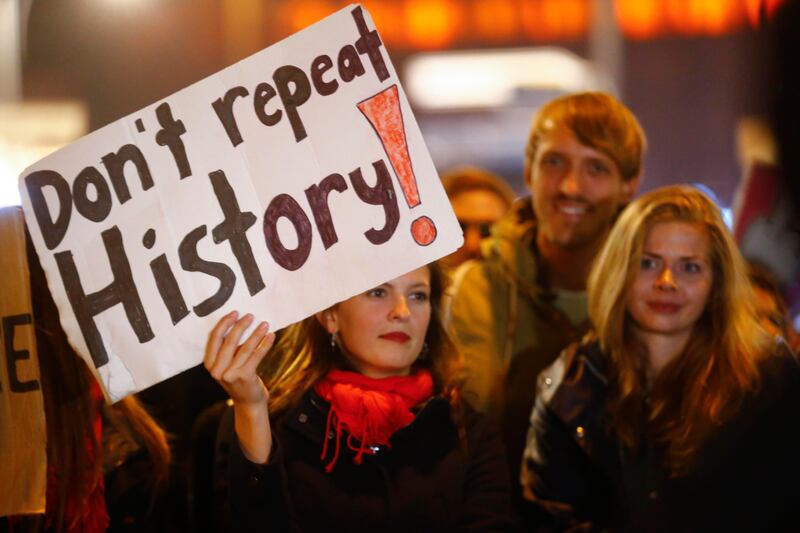Dismal weather across much of Germany on election day failed to prevent the country punishing Angela Merkel for her 'open door' refugee policy as the far-right now steams in to parliament as the main opposition against her.
Although she won an historic fourth term in power the price was high - a strong anti-immigration, anti-Muslim and eurosceptic bloc called the Alternative for Germany party (AfD) has garnered nearly 100 seats in the national legislature.
It was a victory that the founding fathers of the post-Nazi republic vowed should never occur again. But it has and Europe finds itself a very different place this week from where it was before the election.
To describe the mood as euphoric at AfD headquarters in Berlin would be an understatement. Loud cheers erupted as the exit poll results were announced and Alexander Gauland, leader of the party, said: "This is our day!
"We will take back our country and our people!" he screamed in a nightclub in the east of Berlin where the AfD gathered to celebrate its victory.
Jubilant supporters sang the national anthem as police moved reinforcements into the area in case of counter demonstrations from leftists.
In a speech devoid of magnanimity in victory, Mr Gauland promised to "hunt Merkel down" as the party pledged to "reclaim our people and our country."
Almost all AfD supporters are former Merkel loyalists who turned away from her conservative CDU party because of her decision to open Germany's borders to more than a million refugees. Among the masses of asylum seekers were numerous ISIL terrorists who have killed and maimed people in several attacks.
As for the chancellor, the most powerful politician in Europe faced flying tomatoes and taunts of "traitor" and "go back to your Muslims" on the campaign trail.
The way the numbers crunched at exit polls as voting closed at 6.00pm in Berlin showed Ms Merkel's CDU with 32.5 percent of the vote, the centre-left SPD - who were in a "grand coalition" with the CDU - on 20 percent and the AfD with a staggering 13.5 percent.
If they remain accurate , the AfD will have 89 MPs in the next German parliament. Ms Merkel’s CDU/CSU will hold 216 seats and the SPD will be on 133. Meanwhile Greens, FDP and Die Linke will all have between 60 and 70 seats.
The AfD's strong showing means it takes control of the enormously powerful budget committee in the Bundestag, the federal parliament, where it will be in a position to stall projects it does not approve of. In essence, Ms Merkel is likely to spend the next four years trying to woo back her supporters from the AfD while simultaneously seeking to dull its influence on national life.
________________________
Read more:
[ She stands for continuity but Merkel has changed Germany and made room for the far-right ]
[ 'Mutti' Merkel is hated by some but still looks unbeatable in German election ]
[ Merkel at mercy of Turkey and Russia as she seeks fourth term as chancellor ]
________________________
Yet many feel she has no one but herself to blame for the success of the AfD in this election. On Friday, with millions of voters still undecided about which way to leap, a parliamentary legal report was leaked in which non partisan lawyers declared her decision to allow in refugees without consulting parliament was wrong.
The findings of the legal report - which was commissioned by the Bundestag, the German parliament - may have cost her dearly, and complicates legislation over the next four years.
The presence of the far-right in parliament could intensify the difficulties in relations with both Russian president Vladimir Putin and US president Donald Trump. It will certainly make her want to focus more on domestic policy than foreign.
As far as Brexit goes, Britain can expect little in the way of favouritism from a leader desperate to shore up unity in a fractious EU. It never featured once as a topic on the campaign trail and is hardly likely to appear anywhere near the top of her agenda now.
Disappointing though the AfD showing undoubtedly was for Ms Merkel, for her SPD rival Martin Schulz the election was a wipe out - the party's worst showing ever. Mr Schulz, a former head of the European Parliament is probably headed for retirement after admitting, "Today was a difficult and a bitter day for the Social Democrats. I don't want to beat about the bush, we missed our targets and lost the election."
The voting system means that all German governments are inevitably coalitions and it could take weeks or months of wrangling before the new administration is formed. And because all major parties have vowed not to team up with the AfD it will remain a potent opposition with no allies in parliament..
With the liberal, pro-business Free Democrats (FDP) scoring 10.5 percent of the vote, and the environmentally-friendly Greens notching up a better-than-expected 9.5 percent, a three-wheel coalition for the next four years is a possibility.
Still, there is no getting away from the tectonic shift to the right among large sections of the German people. After the exit poll results were announced, Germany's biggest-selling newspaper Bild commented: "Merkel victorious, but...."
________________________
Read more:
[ Migration tensions seep into German election campaign ]
[ Will Merkel's low-key, serious style win her a fourth term as chancellor of Germany? ]
[ Why the world needs more leadership that's made in Germany ]
________________________






